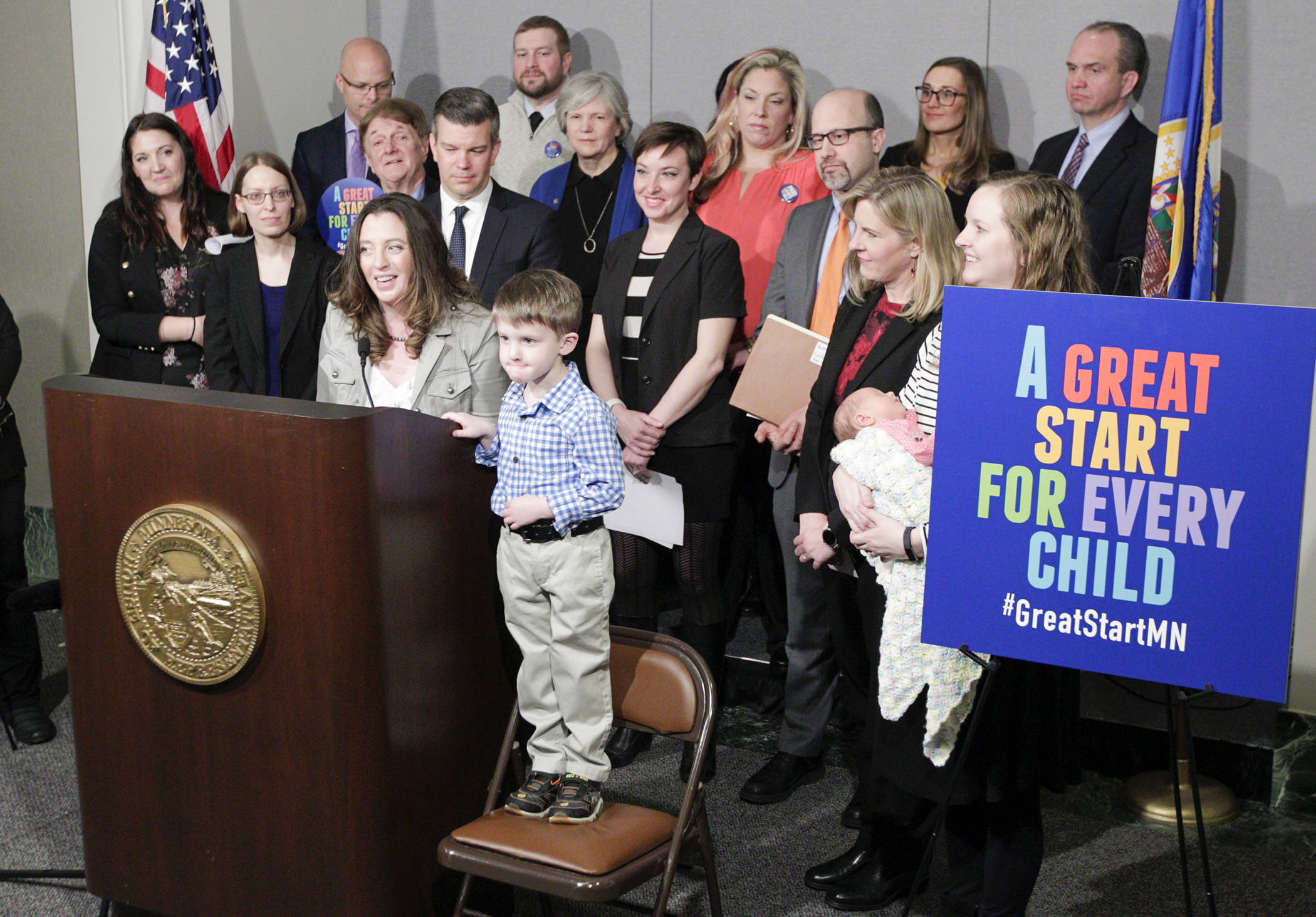Early childhood division OKs ‘Great Start for All Minnesota Children Act’

From a shortage of affordable child care providers, to significant opportunity and achievement gaps, the state is facing what some believe is a child care crisis.
With an eye on addressing those problems, the House Early Childhood Finance and Policy Division approved HF1, as amended, Thursday.
Sponsored by Rep. Carlie Kotyza-Witthuhn (DFL-Eden Prairie), the bill dubbed the “Great Start for All Minnesota Children Act,” aims to address the child care shortage and invests in early care and learning opportunities through several policy changes and $500 million in appropriations. The investments would be made by dipping into the state’s projected $1.3 billion budget surplus.
The bill now heads to the House Health and Human Services Finance Division. Its companion, SF820, awaits action by the Senate Health and Human Services Finance and Policy Committee. Sen. Melissa Wiklund (DFL-Bloomington) is the sponsor.
“We can make incremental change for everyone that needs it, and I think this bill does a really good job of that,” Kotyza-Witthuhn said.
Early childhood scholarship eligibility changes
Division members adopted an amendment containing primarily technical changes with the exception of a change to early learning scholarship eligibility.
Currently, in order for providers to be eligible to accept early learning scholarship funds, they must achieve a three- or four-star rating under the state’s Quality Rating & Improvement System, by July 1, 2020. However, the rating system, called Parent Aware, has been characterized as unfair, particularly to family providers.
“The way the Parent Aware program has been managed, it’s not been advantageous or a good business model for family providers,” Cyndi Cunningham, a family child care provider, told the division Tuesday evening.
A higher star rating isn’t why parents choose a family provider, and it doesn’t offer financial benefits for their businesses, Cunningham said. Instead, she suggested that eligibility be dependent on the percentage of child care programs who have received the rating rather than a deadline.
The adopted amendment would require that the three- or four-star rating requirement go into effect when 40% of the state’s child care programs have received a rating, rather than by the original proposed deadline of July 1, 2022.
The bill also includes a one-time appropriation for early learning scholarships in Fiscal Year 2021, and it would lower the scholarship age eligibility from 3 or 4, to birth through age 3, with a few exceptions for 4-year-olds. Critics, including Rep. Nolan West (R-Blaine), say this will create a loophole that will eliminate many four-year-olds from the program.
“You can expand it with getting more funds to earlier years, I can get behind that, but narrowing funds for the best program that I hear about from people from my district … I don’t think is a good idea,” he said.
Kotyza-Witthuhn defended the decision citing research that indicates children are particularly formative during the first three years and that 4-year-olds often have more early education options.
Statewide rate for Child Care Assistance Program
Another notable component of the proposal would create a statewide reimbursement rate for providers who accept Child Care Assistance Program funds. Currently there are two separate rates, one for the metro area and one for Greater Minnesota, which are based on the cost of living and a variety of different factors. However, the cost associated with running a child care business is relatively the same across the state. With a statewide rate, providers in Greater Minnesota who accept Child Care Assistance Program funds would be getting more equitable reimbursement.
Motion to table the bill
Citing concerns about Child Care Assistance Program integrity, the lack of regulatory reform, changes to early childhood scholarship eligibility and the use of one-time appropriations rather than ongoing funding, Rep. Mary Franson (R-Alexandria) made a motion, unsuccessfully, to table the proposal.
“This bill is framed as a down payment with no promise or plan to follow up with additional funding to maintain the large increases in the provider rates, eliminating the CCAP waiting list or sustaining the growth in the early learning scholarships,” she said
Rep. Dave Pinto (DFL-St. Paul), the division chair, explained that because the Legislature is in the middle of a budget cycle, the ability to approve ongoing funding for programs is limited. But, with the current budget surplus, they do have the opportunity to supplement programs they feel will make a big impact.
“We have an opportunity with funds that are available to make a difference in a child’s life and in fact many children’s lives,” he said.
Related Articles
Search Session Daily
Advanced Search OptionsPriority Dailies
Ways and Means Committee OKs proposed $512 million supplemental budget on party-line vote
By Mike Cook Meeting more needs or fiscal irresponsibility is one way to sum up the differences among the two parties on a supplemental spending package a year after a $72 billion state budg...
Meeting more needs or fiscal irresponsibility is one way to sum up the differences among the two parties on a supplemental spending package a year after a $72 billion state budg...
Minnesota’s projected budget surplus balloons to $3.7 billion, but fiscal pressure still looms
By Rob Hubbard Just as Minnesota has experienced a warmer winter than usual, so has the state’s budget outlook warmed over the past few months.
On Thursday, Minnesota Management and Budget...
Just as Minnesota has experienced a warmer winter than usual, so has the state’s budget outlook warmed over the past few months.
On Thursday, Minnesota Management and Budget...